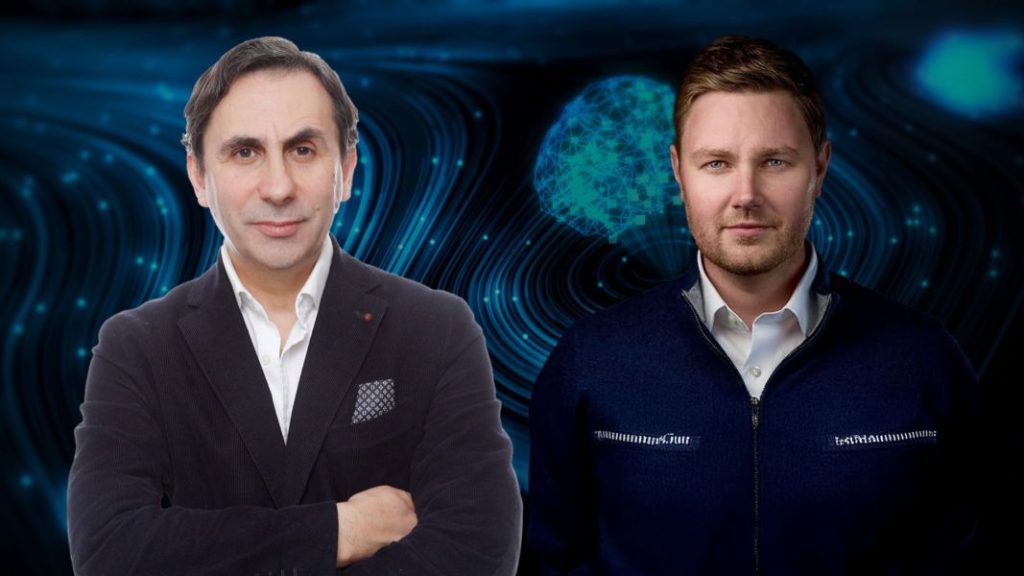In the latest episode of the Dinis Guarda Podcast, Brian Evergreen, founder of The Future Solving Company, discusses the evolution of AI agents, the importance of AI education, and how his initiatives like the Future Solving World Tour are shaping the future of business, technology, and culture. The podcast is powered by Businessabc.net, Citiesabc.com, Wisdomia.ai, and Sportsabc.org.

Brian Evergreen is a recognised expert in artificial intelligence (AI) and strategy. He is the author of ‘Autonomous Transformation: Creating a More Human Future in the Era of AI’, which has been praised as a “Must-Read” by the Next Big Idea Club and named one of Thinkers50’s Top 10 Best New Management Books for 2024.
He was also included in Edelman’s Top 50 AI Creators You Need to Know in 2025. Brian is also the founder of The Future Solving Company, where he helps organisations prepare for the future of AI. He has provided advice to over a dozen Fortune 500 companies, drawing on his experience at leading firms like Accenture, AWS, and Microsoft. At Microsoft, he served as the Global Head of Autonomous AI Co-Innovation and led AI Strategy for Microsoft US.
During the interview with Dinis, Brian discusses the future of AI:
“I do not think that we’re on a path or that we’ve reached any form of AGI. I personally have not seen anything that would give me that impression. There’s a lot of excitement, but I believe we’re on an S-curve, and not everything is moving as quickly as some people think.
Generative AI, especially tools like ChatGPT, are exciting because they’re the first version of AI that anyone can easily access and experience. People who know nothing about AI can type into ChatGPT and see what it can do. That’s why it took off the way it did.”
Talking about agentic AI and its potential, Brian says,
“People are getting excited about AI agents, especially with the focus on LLMs. However, I believe LLM-based agents are more like ‘mouth-for-brain’ AI because they lack true cognitive capabilities. It’s not a brain; it’s just a tool for decision-making.
Creating one AI agent to do everything is like a one-man band. It might impress in one context, but it’s not suitable for complex environments like enterprises where even 1% error can cause significant losses.”
AI agents: Transforming industries with autonomous innovation
Brian discusses the concept of AI agents and their implications in various industries:
First, you have AI systems that are a source of information, like a source in an intelligence community—providing answers, but they may need verification. Then, you have researchers who dig deeper, like generative models that find information. The third type is a trainer, where systems use expert videos to train users. The fourth is the true AI agent, which can make decisions autonomously and complete tasks like organising a party or shopping for you.
As a true AI agent, from my side as a consumer, I shouldn’t need to know how many agents are involved. I only care about the outcome: Does it do the thing well and on time, without making unnecessary purchases or mistakes?”
On the potential of AI agents in business, Brian says,
“In the future, AI agents will interact behind the scenes, blurring the lines between organisations. For example, if two lumber companies are sending trucks across the country with the same goods, AI agents will allow these organisations to interact and trade resources seamlessly, making it more efficient and cost-effective.
We’re going to see more value creation through these AI agents, adding more value than we could have created with just traditional models.
AI agents will be microtransacting and negotiating across different agents, taking care of tasks behind the scenes without us needing to be involved in every transaction. It’s an interconnected system that’s more efficient than anything we’ve seen before.”
AI education and career opportunities
Brian explains how AI can be a tool for empowerment rather than a threat to jobs:
“AI education is important, but the first thing we need to do is demystify AI and take the elephant out of the room of fear.
There are a lot of misconceptions about AI, and fear often comes from not understanding the technology. It’s not about fearing AI, but rather how we can use it to solve problems and create value.”
Talking about the role of universities in AI education:
“Universities are making investments to integrate digital and AI education into their curricula, but we still have a gap. Students need to learn not just about the theory, but how to apply it practically.”
On the reality of AI and job security, Brian says,
“We still need people. Companies that are focusing on replacing everything with AI will regret it. People still want that human connection, especially in customer service.
Even the companies that are pushing for full automation, like McDonald’s with their autonomous drive-thru, have realised that people still want to interact with humans, so they’ve pulled back on those initiatives.”
Brian also shares the information about digital and AI learning resources:
“There are many resources out there, such as free courses on Coursera and Code Academy, which are great for gaining skills. I’ve also created a course on Maven called ‘How to Get Into AI’ that provides a series of interviews with AI experts.
You don’t need to rely on expensive degrees to learn AI. You can get started with free or inexpensive resources and build your expertise over time.
When I started at Accenture, AI wasn’t the focus of my role. I learned about AI on my own time and pitched it to leadership, which led to funding for a data scientist. That’s how I got started.
For students, the key is to get a job that supports their living, and then focus on building skills. Learning to work with peers and bosses is a valuable skill that many forget to focus on in school.”
The Future Solving World Tour: A tech-driven initiatives
“The world tour aims to bring thought leaders together with senior executives. We’re focusing on the gap where senior executives often don’t have the opportunity to gather with others in similar roles in their local market.
We pair these leaders with thought leaders, like having someone like Rita McGrath join us for a dinner or breakfast to hear from industry intellectuals.
We’re partnering with companies to choose the right cities, topics, and people to bring together. It’s an exclusive, VIP experience for senior leaders in the industry.
If you’re a VP or a C-level executive and you’d like to participate in the world tour, you can sign up on our platform.”
Concluding the interview, Brian shares exciting upcoming initiatives that blend innovation, business, technology, and culture:
“I’m co-hosting a summit with Snoop Dogg at his compound in Los Angeles. It’s bringing together business, tech, and Hollywood leaders for a nonpartisan conversation about the future.
We’ll have a series of Fireside panels, such as the future of music, future of AI, future of work, and more. Snoop will lead the conversation on the future of music.”

Shikha Negi is a Content Writer at ztudium with expertise in writing and proofreading content. Having created more than 500 articles encompassing a diverse range of educational topics, from breaking news to in-depth analysis and long-form content, Shikha has a deep understanding of emerging trends in business, technology (including AI, blockchain, and the metaverse), and societal shifts, As the author at Sarvgyan News, Shikha has demonstrated expertise in crafting engaging and informative content tailored for various audiences, including students, educators, and professionals.











